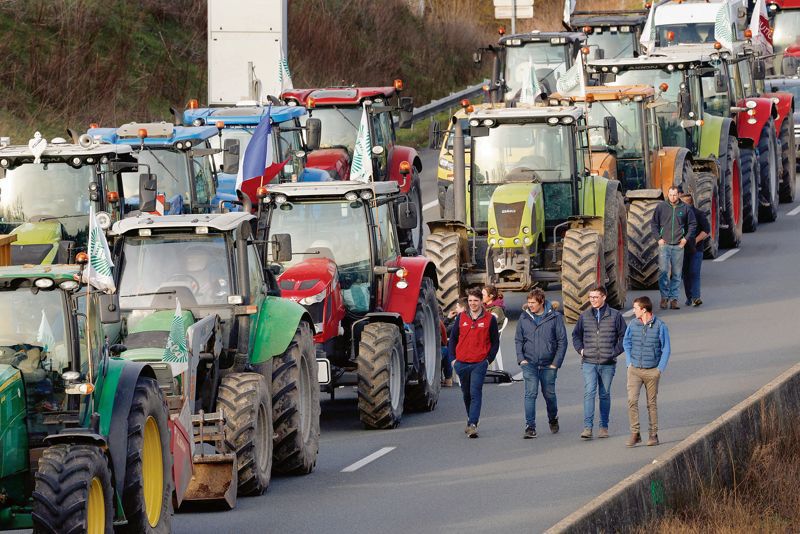
TWENTY-SEVEN nations of Europe are members of the Brussels-headquartered European Union (EU) and 20 have the euro as their currency. Further, as many as 29 European countries are part of the US-led NATO. Europe has some tiny landlocked nations that can’t survive and thrive without the goodwill of their neighbours.
Today, the EU is facing a huge dilemma. Protesting farmers are driving their tractors through the streets of Brussels, Paris, Berlin, Madrid and other cities; they are hurling stones and eggs, besides choking roads. Their complaints include excessive environmental restrictions and regulations, irrational and back-breaking taxes and the cheap import of grains from Ukraine, Chile and New Zealand. “We no longer make a living from our profession,” is the common refrain of farmers in EU countries.
Europe has been on the boil for several weeks, right from Spain, Portugal and Greece to France, Belgium, Holland, Germany, Poland, Romania and Hungary. Though farming accounts for only 1.4 per cent of the EU’s GDP, last year’s protests in Eastern Europe (Poland, Romania and Bulgaria) over cheap Ukrainian food grains had shown that farmers were capable of creating major disruptions despite being a tiny group. Yet, the EU has disdainfully failed to read the writing on the wall and address the grievances of grain growers.
Soil-tilling protesters justifiably feel that the current system makes a mockery of both farmers and consumers while pandering to multinational corporations. By ignoring the diversity of EU states and imposing a ‘common agriculture policy’, the EU has overlooked the fact that each of the 27 member countries has unique grievances and requirements, just like various states in India. The far-sighted framers of the Indian Constitution rightly declared that agriculture has to be a state subject and not on the Union list; in contrast, the EU has shown poor judgement. What can be produced easily in Punjab may not be done in Tamil Nadu, Gujarat, Andhra Pradesh, West Bengal or Odisha, and vice versa. Geography, weather conditions, groundwater, rainfall and soil vary from one state to another and from one region to another. So is the case with Europe.
In Europe, however, what stands out starkly is the quick acknowledgement by some leaders of the affected nations of the rationale of the unprecedented agitation by farmers. Although the French ‘proletariat’ customarily pioneered the agitation, its ‘bourgeoisie’ leaders moved fast to meet the agitators on the road. Consequently, the latter reciprocated and softened their combative stand as both the PM and President of France, out of fear or otherwise, agreed and tried to address the grievances that led to the mass movement.
When farmers’ tractors rumbled through Brussels’ boulevards with banners like ‘Ursula, we are here’ (a reference to European Commission chief Ursula von der Leyen), no one criticised the combative farmers who produce food grains to feed nations as ‘anti-national’. In fact, European Parliament member Virginie Joron ‘praised’ the protesters. “They have my support,” she said. Belgium PM Alexander De Croo found the farmers’ concerns “perfectly legitimate”. Ireland PM Leo Varadkar echoed this sentiment. French President Emmanuel Macron and PM Gabriel Attal agreed to give $162 million in aid to livestock farmers, besides a $2.16-billion package to facilitate loans for those entering the farm sector. Other European leaders are trying to deflate much-hyped, deceptive theories of globalisation. EU governments, for now at least, seem keen to boost the farmers’ income, protect them against unfair competition and improve their lives.
Indeed, what France has done today again goes to vindicate the words of Klemens Wenzel von Metternich, 19th-century Austrian Chancellor and statesman: “When France sneezes, the rest of Europe catches a cold”. Simply put, European farmers have given a warning to the cheerleaders of globalisation, whose sole motto appears to be to hand over national assets to multinational corporations that thrive on cash, profit and exploitation. Thus, when the EU provided 50 billion euros to Ukraine to fight Europe’s proxy war, enlightened farmers sent a shock reminder that the EU must start working again for its citizens, farmers, gardeners, fishermen, communities, families and entrepreneurs. The welfare of citizens should override the interests of invaders and expansionists masquerading as developers. India needs to remember that too.
Thus, given a choice, what is the absolute necessity for a nation-state or its people: food or firepower? What does a human crave in daily life: to be well-fed or to go to sleep on an empty stomach? Does a human first need food or firearms? If a human (non-soldier) gets two meals a day, how keen would he be to pull the trigger to kill people around him?
Europe realised the farmers’ needs soon after World War II in an effort to ensure food security for its citizens. Hence, all major countries heavily subsidised the agrarian sector, and it is a must for countries that have experienced man-made famines, such as India. Farmers must be looked after and protected by the state for the overall economic development of India.
BY : Abhijit Bhattacharyya
source : tribuneindia.com
